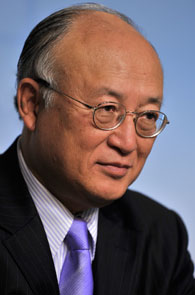IAEA Director General’s Briefing: Fukushima Nuclear Accident – Speeches
Ladies and Gentlemen,
I will make a few general introductory remarks before handing over to my colleagues for the Technical Briefing. The current situation can be summarised as follows:
- Situation remains very serious.
- Priority now is to overcome the crisis.
- We are also planning ahead.
- The IAEA is doing everything in its power to help Japan.
Let me elaborate a little.

The crisis at the Fukushima Daiichi plant has still not been overcome and it will take some time to stabilise the reactors.
For now, radioactivity in the environment, foodstuffs and water – including the sea – is a matter of concern in the vicinity of the Fukushima plant and beyond. Current levels indicate a need for further comprehensive monitoring.
On the positive side, electrical power has been restored at Units 1, 2 and 3 and fresh water is now available on the site.
Since I addressed the special Board meeting a week ago, we have put two radiation monitoring teams on the ground in Japan.
An FAO/IAEA Food Safety Assessment Team is also now on the spot, meeting officials in prefectures affected by contamination.
In a crisis of this nature, it is vital to provide, and share, speedy and accurate information.
From the beginning, we have been working closely with the Japanese government and with the safety agency NISA.
My visit to Tokyo, and the presence of IAEA staff on the ground, have improved both the flow of information and the level of mutual understanding of a variety of technical issues.
This has been an interactive process: as well as receiving information, we have been asking questions, providing advice and obtaining clarifications.
On Friday (25 March 2011), I took part in a video conference with UN Secretary-General Ban Ki-Moon and the heads of a number of major Agencies.
I explained that we have been working fully in accordance with the Joint Radiation Emergency Management Plan of the International Organizations. The Plan is co-sponsored by fifteen organisations and the IAEA is the focal coordinating body.
Our Incident and Emergency Centre has distributed information, channelled offers of cooperation, sent missions to Japan, and coordinated with partners including WHO, FAO, WMO, ICAO and CTBTO.
I will meet the UN Secretary General and the heads of agencies again later this week at the Chief Executives’ Board meeting in Kenya to strengthen coordination.
Ladies and gentlemen,
The crisis is not yet over, but we need to start thinking about the future.
Once the situation has been stabilised, the Agency would like to send an international expert mission to conduct an assessment of the accident. This should include an element of peer review.
The Fukushima crisis has confronted the Agency and the international community with a major challenge.
It is vitally important that we learn the right lessons from what happened on March 11, and afterwards, in order to strengthen nuclear safety throughout the world.
Following my statement at the Board of Governors meeting last week (21 March 2011), many countries joined my call for robust follow-up action.
I would therefore like to propose that a high-level IAEA conference on Nuclear Safety should take place here in Vienna before the summer.
The conference should cover the following points:
- an initial assessment of the Fukushima accident, its impact and consequences;
- considering the lessons that need to be learned;
- launching the process of strengthening nuclear safety;
- and strengthening the response to nuclear accidents and emergencies.
The work ahead will be substantial. I firmly believe that the IAEA is the best venue for follow-up on the Fukushima accident. We have the necessary expertise, extensive membership and can ensure transparency.
I will keep you informed and count on your full support and cooperation.
Thank you.
